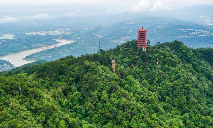Linyi of China's Shandong seizes development opportunities provided by neighboring Yangtze River Delta
Linyi city of east China's Shandong Province has ramped up efforts to develop local agriculture and tourism industries in recent years, seeking to seize development opportunities offered by the neighboring Yangtze River Delta lying to its south.
By fully tapping the potential for agricultural production in the area, Lanling county has bolstered the brand influence of its farm produce grown in the Yangtze River Delta. Home to 1.2 million mu (80,000 hectares) of vegetables fields, the county has an annual output of 5 million tons, and boasts 25 provincial-level standard planting bases. “After being picked, the vegetables can reach the markets in Shanghai in about seven hours,” said an official from the publicity department of Lanling.

Photo shows scenery in Zhuquan village in Yinan county, Linyi city, Shandong Province. (Photo/Qilu Evening News)
In the county’s Xuhuanglu village, a cooperative was jointly established in July 2011 by Xu Zhendong, Party secretary of the village, together with 326 households in the locality. The cooperative planted cucumbers, tomatoes and peppers to cater for the needs of urban consumers in Shanghai, having recovered its costs in the same year it started operations.
Now with over 430 members, the cooperative has transferred 3,600 mu of fields from four villages, built some 1,320 greenhouses, and has become a high-standard demonstration zone for vegetable cultivation in Lanling. By cooperating with a host of enterprises and supermarkets located in Shanghai along the Yangtze River Delta, it is able to sell over 13 million kilograms of vegetables annually.
“Look at this pepper. It is a high-end variety of our cooperative. Its profit for every mu of land reaches 15,000 yuan (about $2,254.5) per year,” introduced Xu, who is also head of the cooperative.
Besides, Linyi has developed tourism locally in a comprehensive way by integrating local features such as rural tourism, history, culture, intangible cultural heritage, and hot springs, attracting many tourists from the Yangtze River Delta.
“Linyi receives over 50 million tourists every year now. The beautiful scenery here is generating wealth for local residents,” said Ren Gang, secretary of the Linyi Municipal Committee of the Communist Party of China.
Home to bamboo forests, springs, and orchards, Zhuquan village in Yinan county has witnessed the arrival of a growing number of tourists in recent years, particularly those traveling within the wider Yangtze River Delta region, according to Wang Yanbing, an executive from the Shandong Longteng Zhuquan Tourism Company.
Photos
Related Stories
- Postgraduate students specializing in agriculture help bring prosperity to farming village in outskirts of Beijing
- China Development Bank issues 8 bln yuan in bonds to boost rural vitalization
- SW China's Taijiang County taps local speciality industries to promote rural vitalization
- Rural mud house renovation program benefits villagers in NW China’s Shaanxi province
- Rural vitalization promotes economic development in mountainous area in Guangxi
- Digital village construction brings better lives to rural residents
- Innovative financial services facilitate rural industries in Ningde, SE China's Fujian
- People from “cliff village” in SW China’s Sichuan enjoy better lives
- Digitalization boosts rural vitalization in SW China’s Guizhou
- E-commerce, intangible cultural heritage inject impetus into rural vitalization in China
Copyright © 2022 People's Daily Online. All Rights Reserved.









